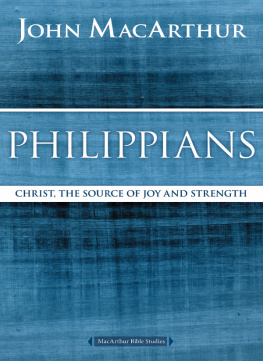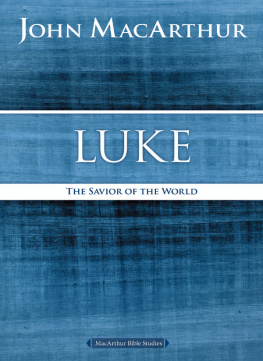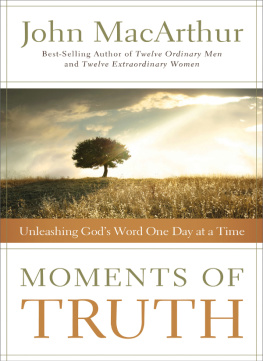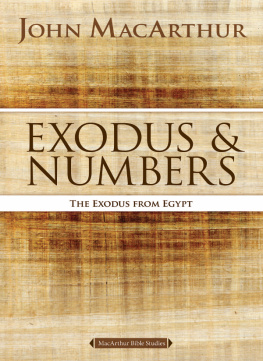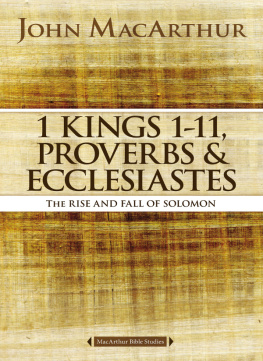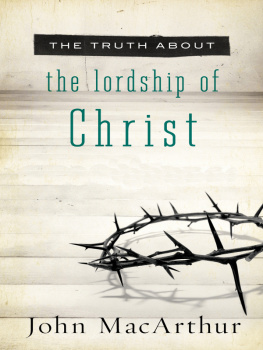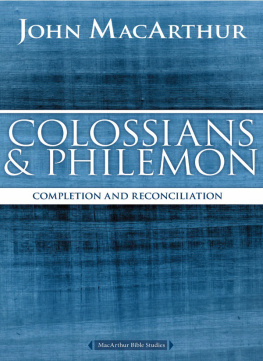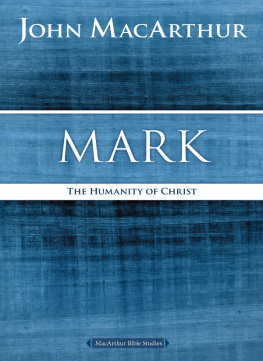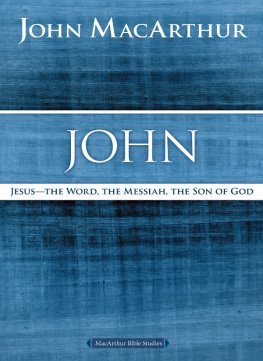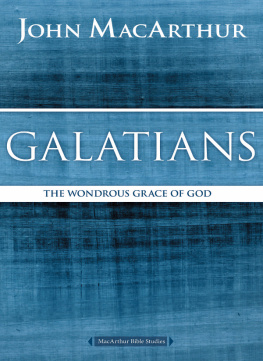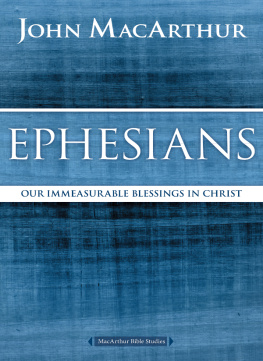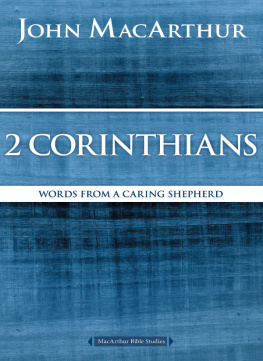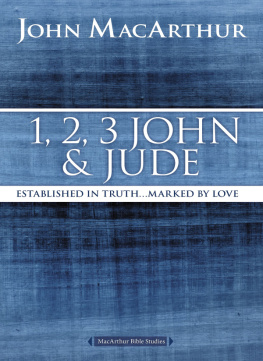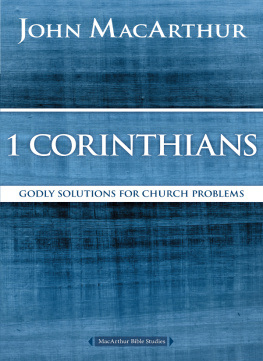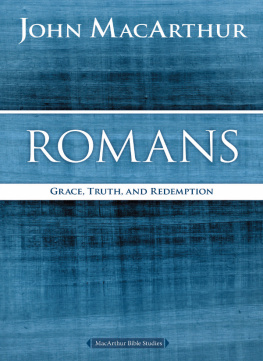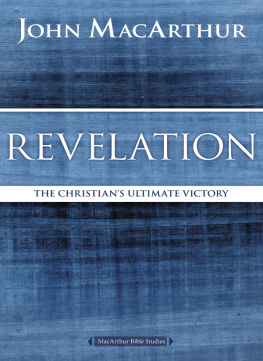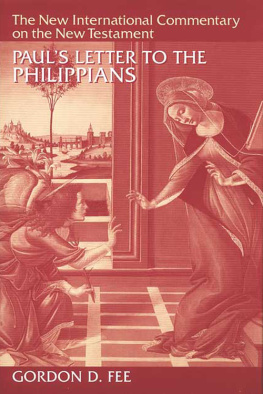PHILIPPIANS
MACARTHUR BIBLE STUDIES
2007, John MacArthur.
All rights reserved. No portion of this book may be reproduced, stored in a retrieval system, or transmitted in any form or by any meanselectronic, mechanical, photocopy, recording, or any otherexcept for brief quotations in printed reviews, without the prior permission of the publisher.
John MacArthur
Unleashing Gods Truth, One Verse at a Time
Unleashing Gods Truth, One Verse at a Time is a trademark of Grace to You. All rights reserved.
Published in Nashville, Tennessee, by Nelson Books, an imprint of Thomas Nelson. Nelson Books and Thomas Nelson are registered trademarks of HarperCollins Christian Publishing, Inc.
Nelson Books titles may be purchased in bulk for education, business, fundraising, or sales promotional use. For information, please email SpecialMarkets@ThomasNelson.com
Produced with the assistance of the Livingstone Corporation. Project staff include Jake Barton, Mary Horner Collins, and Andy Culbertson.
Project editor: Len Woods
Scripture quotations marked NKJV are taken from The Holy Bible, New King James Version. 1979, 1980, 1982, 1992 Thomas Nelson, Inc. Publishers.
Keys to the Text and Truth for Today material is taken from the following sources:
Anxiety Attacked. 1993 by John MacArthur, Jr. Published by Victor Books, Wheaton, Illinois.
The MacArthur Study Bible (electronic ed.). John MacArthur, General Editor. 1997 by Word Publishing. All rights reserved. Used by permission.
Our Sufficiency in Christ. 1991 by John MacArthur. Word Publishing, a Division of Thomas Nelson, Inc. Dallas, TX.
Philippians. MacArthur New Testament Commentary Series. 2001 by John MacArthur. Published by Moody Press, Chicago, Illinois. Used by permission.
Cover Art by Holly Sharp Design
Interior Design and Composition by Joel Bartlett, Livingstone Corporation
ISBN: 978-0-7180-3511-2
ISBN: 978-0-7180-3530-3 (eBook)
15 16 17 18 19 RRD 6 5 4 3 2 1
CONTENTS
The Epistle of Joy
Philippians 1:111
The Joy of Ministry
Philippians 1:1226
Conduct Worthy of Christ
Philippians 1:2730
Spiritual Unity
Philippians 2:14
The Incarnation and Exaltation of Christ
Philippians 2:511
God at Work in You
Philippians 2:1213
Stop Complaining!
Philippians 2:1416
Model Spiritual Servants
Philippians 2:1730
The Distinguishing Marks of True Believers
Philippians 3:111
Reaching for the Prize
Philippians 3:1221
Spiritual Stability
Philippians 4:19
The Secret of Contentment
Philippians 4:1023
Philippians derives its name from the Greek city where the church to which it was addressed was located. Philippi was the first town in Macedonia where Paul established a church.
AUTHOR AND DATE
The unanimous testimony of the early church was that the apostle Paul wrote Philippians. Nothing in the letter would have motivated a forger to write it.
The question of when Philippians was written cannot be separated from that of where it was written. The traditional view is that Philippians, along with the other Prison Epistles (Ephesians, Colossians, Philemon), was written during Pauls first imprisonment at Rome (ca. AD 6062). The most natural understanding of the references to the palace guard (1:13) and the saints... of Caesars household (4:22) is that Paul wrote from Rome, where the emperor lived. The similarities between the details of Pauls imprisonment given in Acts and in the Prison Epistles also argue that those epistles were written from Rome (e.g., Paul was guarded by soldiers, Acts 28:16; see 1:1314; was permitted to receive visitors, Acts 28:30; see 4:18; and had the opportunity to preach the gospel, Acts 28:31; see 1:1214; Eph. 6:1820; Col. 4:24).
Some have held that Paul wrote the Prison Epistles during his two-year imprisonment at Caesarea (Acts 24:27). But Pauls opportunities to receive visitors and proclaim the gospel were severely limited during that imprisonment (see Acts 23:35). The Prison Epistles express Pauls hope for a favorable verdict (1:25; 2:24; see Philem. 22). In Caesarea, however, Pauls only hope for release was either to bribe Felix (Acts 24:26), or agree to stand trial at Jerusalem under Festus (Acts 25:9). In the Prison Epistles, Paul expected the decision in his case to be final (1:2023; 2:17, 23). That could not have been true at Caesarea, since Paul could and did appeal his case to the emperor.
Another alternative has been that Paul wrote the Prison Epistles from Ephesus. But at Ephesus, like Caesarea, no final decision could be made in his case because of his right to appeal to the emperor. Also, Luke was with Paul when he wrote Colossians (Col. 4:14), but he apparently was not with the apostle at Ephesus. Acts 19, which records Pauls stay in Ephesus, is not in one of the we sections of Acts. The most telling argument against Ephesus as the point of origin for the Prison Epistles, however, is that there is no evidence that Paul was ever imprisoned at Ephesus.
In light of the serious difficulties faced by both the Caesarean and Ephesian views, there is no reason to reject the traditional view that Paul wrote the Prison Epistlesincluding Philippiansfrom Rome.
Pauls belief that his case would soon be decided (2:2324) points to Philippians being written toward the close of the apostles two-year Roman imprisonment (ca. AD 61).
BACKGROUND AND SETTING
Originally known as Krenides (The Little Fountains) because of the numerous nearby springs, Philippi (city of Philip) received its name from Philip II of Macedon (the father of Alexander the Great). Attracted by the nearby gold mines, Philip conquered the region in the fourth century BC. In the second century BC, Philippi became part of the Roman province of Macedonia.
The city existed in relative obscurity for the next two centuries until one of the most famous events in Roman history brought it recognition and expansion. In 42 BC, the forces of Antony and Octavian defeated those of Brutus and Cassius at the Battle of Philippi, thus ending the Roman Republic and ushering in the Empire. After the battle, Philippi became a Roman colony (see Acts 16:12), and many veterans of the Roman army settled there. As a colony, Philippi had autonomy from the provincial government and the same rights granted to cities in Italy, including the use of Roman law, exemption from some taxes, and Roman citizenship for its residents (Acts 16:21). Being a colony was also the source of much civic pride for the Philippians, who used Latin as their official language, adopted Roman customs, and modeled their city government after that of Italian cities. Acts and Philippians both reflect Philippis status as a Roman colony.
Pauls description of Christians as citizens of heaven (3:20) was appropriate, since the Philippians prided themselves on being citizens of Rome (see Acts 16:21). The Philippians may well have known some of the members of the palace guard (1:13) and Caesars household (4:22).
The church at Philippi, the first one founded by Paul in Europe, dates from the apostles second missionary journey (Acts 16:1240). Philippi evidently had a very small Jewish population. Because there were not enough men to form a synagogue (the requirement was for ten Jewish men who were heads of a household), some devout women met outside the city at a place of prayer (Acts 16:13) alongside the Gangites River. Paul preached the gospel to them, and Lydia, a wealthy merchant dealing in expensive purple dyed goods (Acts 16:14), became a believer (16:1415). It is likely that the Philippian church initially met in her spacious home.
Satanic opposition to the new church immediately arose in the person of a demon-possessed, fortune-telling slave girl (Acts 16:1617). Not wanting even agreeable testimony from such an evil source, Paul cast the demon out of her (Acts 16:18). The apostles act enraged the girls masters, who could no longer sell her services as a fortune-teller (Acts 16:19). They hauled Paul and Silas before the citys magistrates (Acts 16:20) and inflamed the civic pride of the Philippians by claiming the two preachers were a threat to Roman customs (Acts 16:2021). As a result, Paul and Silas were beaten and imprisoned (Acts 16:2224).
Next page
